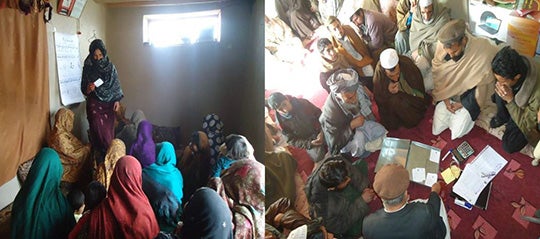Learning from a Social Accountability Pilot in the Mining Sector
The Aynak copper mine in the Mohammad Agha district in Logar province is being developed as one of “resource corridors.” These corridors will connect communities with the benefits of mineral resources and infrastructure which will provide over 10,000 estimated jobs and economic growth in Afghanistan.
In facilitating community participation to make the most of the potential growth opportunity, the World Bank supported the Ministry of Mines and Petroleum (MoMP) pilot a small social accountability project in Aynak, to bridge trust between MoMP and affected communities by making a grievance redress mechanism (GRM) work. GRM is a feedback mechanism based on two-way communication, in which the government takes action or shares information based on community feedback.
The Aynak mine development directly affected 62 families in two villages who had to be relocated. The MoMP prepared a resettlement action plan (RAP), which laid out compensation for these affected families and outlined the GRM, including setting up of the district-level grievance handling committee to address resettlement related complaints. Initially, there was no representation in the committee from two communities, and they were not clear on their roles.
The social accountability pilot supported community mobilization, training on entitlements and GRM, and election of Community Development Council (CDC), following the procedure set by the National Solidary Project (NSP) implemented by the Ministry of Rural Rehabilitation and Development. These activities were facilitated by a civil society organization (CSO), the International Rescue Committee (IRC), which had a long-established presence in Mohammad Agha district and was also a NSP facilitating partner in the district.
The CDC election and participation in the district-level grievance handling committee were made possible by IRC’s hard work in the district. The affected community members noted that they did not know what the government was giving them until IRC implemented the pilot. IRC’s work was also recognized by MoMP, which appointed IRC as a CSO representative in the grievance handing committee. It is expected that IRC will provide continued handholding support to the CDC and affected families as the Aynak operation progresses.
The pilot also supported MoMP’s capacity building on GRM. Two GRM learning video conferences linking between Kabul and DC were organized, in which the World Bank’s GRM expert presented the overview and international good practices to the Aynak and other MoMP Authorities. There also were two workshops in Kabul, one joined by CDC members and the Metallurgical Corporation of China (MCC, the Aynak contractor).
The pilot successfully built the MoMP’s buy-in and ownership in the GRM design as a part of the RAP. It also was a learning experience for the IRC in developing a GRM manual for affected communities and supporting the families to build trust with MoMP. We hope that the GRM could be expanded to the communities around the Aynak mine and address possible grievances related to jobs and growth. It is also hoped that the pilot could potentially be replicated in other mining sites in Afghanistan in nurturing civil society and citizen engagement.



Join the Conversation